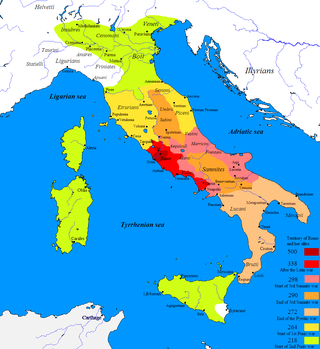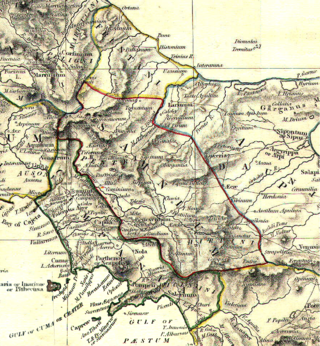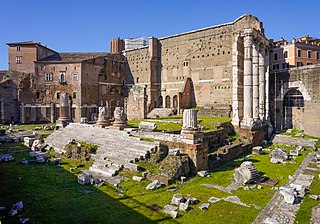Related Research Articles
Year 293 BC was a year of the pre-Julian Roman calendar. At the time it was known as the Year of the Consulship of Cursor and Maximus. The denomination 293 BC for this year has been used since the early medieval period, when the Anno Domini calendar era became the prevalent method in Europe for naming years.

The First, Second, and Third Samnite Wars were fought between the Roman Republic and the Samnites, who lived on a stretch of the Apennine Mountains south of Rome and north of the Lucanian tribe.
Quintus Fabius Maximus Rullianus, son of Marcus Fabius Ambustus, of the patrician Fabii of ancient Rome, was five times consul and a hero of the Samnite Wars. He was brother to Marcus Fabius Ambustus.

Gaius Marius "the Younger" was a Roman republican general and politician who became consul in 82 BC with Gnaeus Papirius Carbo. He was the son of the Gaius Marius who was the victor of the Jugurthine and Cimbric wars. He fought in Sulla's civil war. He committed suicide that same year at Praeneste, after his defeat by Sulla and during the city's capture by Quintus Lucretius Afella.
The gens Papiria was a patrician family at ancient Rome. According to tradition, the Papirii had already achieved prominence in the time of the kings, and the first Rex Sacrorum and Pontifex Maximus of the Republic were members of this gens. Lucius Papirius Mugillanus was the first of the Papirii to obtain the consulship in 444 BC. The patrician members of the family regularly occupied the highest offices of the Roman state down to the time of the Punic Wars. Their most famous member was Lucius Papirius Cursor, five times consul between 326 and 313 BC, who earned three triumphs during the Samnite Wars. Most of the Papirii who held office under the later Republic belonged to various plebeian branches of the family. Although the most illustrious Papirii flourished in the time of the Republic, a number of the family continued to hold high office during the first two centuries of the Empire.

The Province of Sardinia and Corsica was an ancient Roman province including the islands of Sardinia and Corsica.

The Battle of Aquilonia, was fought between the Roman Republic and the Samnites during the Third Samnite War in 293 BC. This battle saw a large Samnite army that had gathered in the mountainous region of Aquilonia to stop Roman expansion, but was decisively defeated by the Roman legionaries led by Consul Lucius Papirius Cursor and Consul Spurius Carvilius.

The Forum of Augustus is one of the Imperial fora of Rome, Italy, built by Augustus. It includes the Temple of Mars Ultor. The incomplete forum and its temple were inaugurated in 2 BC, 40 years after they were first vowed.
Manius Pomponius Matho was a Roman general who was elected consul for the year 233 BC with Quintus Fabius Maximus Verrucosus. He was also the maternal grandfather of the general and statesman Scipio Africanus.
Spurius Carvilius C. f. C. n., later surnamed Maximus, was the first member of the plebeian gens Carvilia to obtain the consulship, which he held in 293 BC, and again in 272 BC.

The gens Pomponia was a plebeian family at ancient Rome. Its members appear throughout the history of the Roman Republic, and into imperial times. The first of the gens to achieve prominence was Marcus Pomponius, tribune of the plebs in 449 BC; the first who obtained the consulship was Manius Pomponius Matho in 233 BC.
Marcus Aemilius Barbula was a Roman politician from the gens Aemilia. He was a consul in 230 BC alongside Marcus Junius Pera, succeeding Marcus Pomponius Matho and Gaius Papirius Maso and preceding Lucius Postumius Albinus and Gnaeus Fulvius Centumalus. He was son of Lucius Aemilius Barbula and grandson of Quintus Aemilius Barbula, also consuls, and the third and last of the lineage in this charge.
The Ilienses or Iolaes or Ilians or Iolai ; later known as Diagesbes (Διαγησβεῖς) or Diagebres (Διαγηβρεῖς) were an ancient Nuragic people who lived during the Bronze and Iron Ages in central-southern Sardinia, as well as one of the three major groups among which the ancient Sardinians considered themselves divided. After the Sicilian Wars began with the Punic invasion in the sixth century BC, part of them retreated to the mountainous interior of the island, from which they opposed the foreign rule for centuries.
Lucius Papirius Crassus was a Roman politician. He was appointed dictator in 340 BC, and consul in 336 BC and 330 BC. Lucius Papirius was from the Papiria gens (family) in Rome.
Lucius Papirius Crassus was a consul of the Roman republic in 436 BC and possibly a censor in 430 BC.
Gaius Papirius Crassus was a Roman senator who held the executive state office of consul in 430 BC, as the colleague of Lucius Julius. During their year in office, an eight year long truce may have been signed with the Aequi, but this is uncertain. The consuls also enacted a law which allowed for the payment of fines in cash instead of livestock, in response to some heavy fines levied by the censors, Lucius Papirius and Publius Pinarius. Although the initiative for this law had come from the plebeian tribunes, the consuls preempted them by introducing the measure themselves.
Lucius Papirius Mugillanus was a consul of the Roman Republic in 427 BC, consular tribune in 422 BC and censor in 418 BC.
Marcus Papirius Mugillanus was a consular tribune in 418 and 416 BC, and perhaps consul of the Roman Republic in 411.
Marcus Pomponius Matho was a Roman politician in the third century BC.